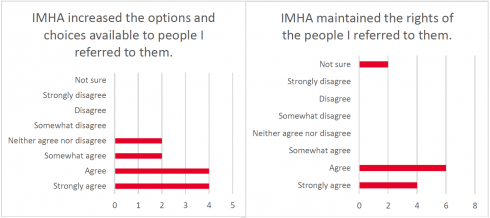- Published:
- Wednesday 13 June 2018 at 2:04 pm
IMHA gives choice and dignity back to consumers – evaluation
Victorian mental health consumers are being given more choices in their treatment and recovery and value our services, according to feedback from our mid-term evaluation.
The evaluation was undertaken by RMIT’s Social and Global Studies Centre, featuring experts in mental health law and service delivery and co-produced with people who have lived experience of the mental health system.
The evaluation used a range of approaches including interviews with key stakeholders, IMHA staff and consumers who have used the service.
Clinical mental health service staff were not consulted in the mid-term review due to time constraints relating to ethical approval processes, however they will be the focus of the final stage of the evaluation.
A final evaluation covering IMHA’s first three years will be released in 2019.
‘The evaluation shows we have exceeded expectations of services but, perhaps more importantly than the figures, it also showed how valued IMHA is by consumers,’ said IMHA Manager Helen Makregiorgos.
‘The vision of IMHA was to ensure consumer rights were promoted and supported and through the evaluation we can see IMHA advocates are doing this, with consumers confirming the impact of our service in their feedback to evaluators, ’said Helen.
Exceeding targets
The evaluation found IMHA had exceeded its key performance indicators, providing 11,492 sessions of advocacy and coaching for self-advocacy and 20,695 information and referral services in the first two years.
All stakeholders gave positive feedback about how IMHA had impacted on consumers and the sector.
‘IMHA appears to be playing an important role in maintaining the rights of people subject to involuntary treatment, although with current funding they are not able to provide advocacy to all who would benefit from it,’ said lead evaluator Dr Chris Maylea.
\
Feedback from consumers in the report was positive. ‘People we spoke to who had used IMHA saw it as a very valuable service, which had helped them when they felt like nobody else would. Even when they didn't get the outcome they wanted, people still valued having IMHA to help them through the process’, said Chris.
‘I think in a way they represent some hope. Especially when you’re isolated. And I think that is in itself a good thing. If you have that, you know, that spark there of ‘someone’s listening to me in a rational way’ and seems to be wanting to help then, that’s a big thing. And then of course, if they follow it up and they can help it’s even better.’ Consumer, IMHA’s Evaluation.
Concerns about data
While areas for further development were acknowledged, they relate to systemic issues which are beyond IMHA’s control or current capacity due to resources.
The evaluation noted that there is a lack of public data about how many people are subject to compulsory treatment in Victoria and therefore eligible for IMHA on any given day, leading to the finding that ‘this makes evidence-based service planning and recommendations for IMHA very difficult’.
There were also recommendations for IMHA to improve the way it collects data and the team is now working with the evaluators to make changes.
‘IMHA’s new database will address all the changes recommended by the evaluators. The database is currently being built and will be ready by the end of 2018,’ said Helen.
The evaluation recommended that IMHA’s resources and remit be increased, to break down access barriers for consumers who are eligible for help.
‘It’s vital that IMHA receive more resources to better serve the needs of consumers in the mental health system, in particular people on community treatment orders who may not have access to information about our services,’ said Helen.
More information
Read the IMHA mid-term evaluation
In the final stage of the evaluation RMIT are seeking feedback from as many people as possible about their experience with IMHA, including mental health professionals. If you have had any contact with IMHA, we’d like to hear about it using this online survey It takes about five minutes and will help us improve IMHA into the future.
For more detailed information about the evaluation email imhaevaluation@rmit.edu.au.
Updated


